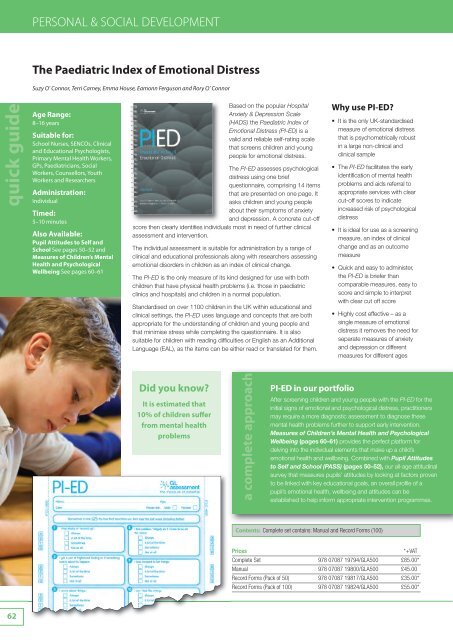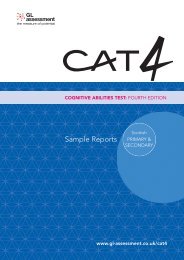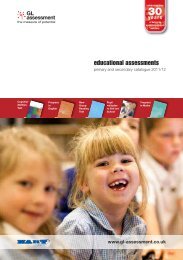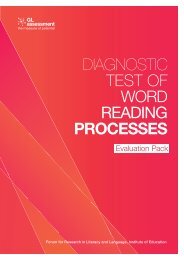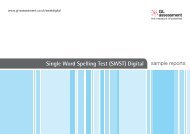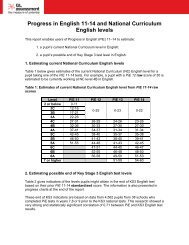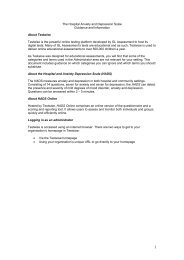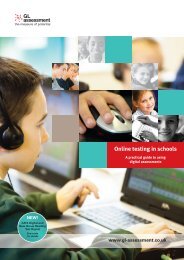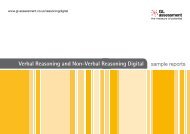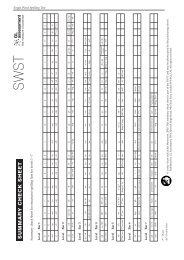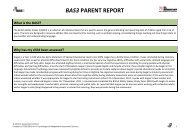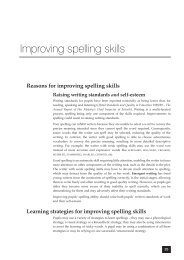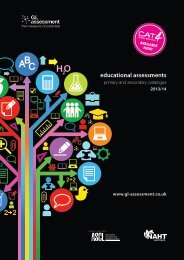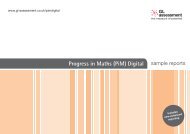educational assessments
quick guide - GL Assessment
quick guide - GL Assessment
- No tags were found...
Create successful ePaper yourself
Turn your PDF publications into a flip-book with our unique Google optimized e-Paper software.
PERSONAL & SOCIAL DEVELOPMENT<br />
The Paediatric Index of Emotional Distress<br />
Suzy O’ Connor, Terri Carney, Emma House, Eamonn Ferguson and Rory O’ Connor<br />
quick guide<br />
Age Range:<br />
8–16 years<br />
Suitable for:<br />
School Nurses, SENCOs, Clinical<br />
and Educational Psychologists,<br />
Primary Mental Health Workers,<br />
GPs, Paediatricians, Social<br />
Workers, Counsellors, Youth<br />
Workers and Researchers<br />
Administration:<br />
Individual<br />
Timed:<br />
5–10 minutes<br />
Also Available:<br />
Pupil Attitudes to Self and<br />
School See pages 50–52 and<br />
Measures of Children’s Mental<br />
Health and Psychological<br />
Wellbeing See pages 60–61<br />
Based on the popular Hospital<br />
Anxiety & Depression Scale<br />
(HADS) the Paediatric Index of<br />
Emotional Distress (PI-ED) is a<br />
valid and reliable self-rating scale<br />
that screens children and young<br />
people for emotional distress.<br />
The PI-ED assesses psychological<br />
distress using one brief<br />
questionnaire, comprising 14 items<br />
that are presented on one page. It<br />
asks children and young people<br />
about their symptoms of anxiety<br />
and depression. A concrete cut-off<br />
score then clearly identifies individuals most in need of further clinical<br />
assessment and intervention.<br />
The individual assessment is suitable for administration by a range of<br />
clinical and <strong>educational</strong> professionals along with researchers assessing<br />
emotional disorders in children as an index of clinical change.<br />
The PI-ED is the only measure of its kind designed for use with both<br />
children that have physical health problems (i.e. those in paediatric<br />
clinics and hospitals) and children in a normal population.<br />
Standardised on over 1100 children in the UK within <strong>educational</strong> and<br />
clinical settings, the PI-ED uses language and concepts that are both<br />
appropriate for the understanding of children and young people and<br />
that minimise stress while completing the questionnaire. It is also<br />
suitable for children with reading difficulties or English as an Additional<br />
Language (EAL), as the items can be either read or translated for them.<br />
Why use PI-ED?<br />
• It is the only UK-standardised<br />
measure of emotional distress<br />
that is psychometrically robust<br />
in a large non-clinical and<br />
clinical sample<br />
• The PI-ED facilitates the early<br />
identification of mental health<br />
problems and aids referral to<br />
appropriate services with clear<br />
cut-off scores to indicate<br />
increased risk of psychological<br />
distress<br />
• It is ideal for use as a screening<br />
measure, an index of clinical<br />
change and as an outcome<br />
measure<br />
• Quick and easy to administer,<br />
the PI-ED is briefer than<br />
comparable measures, easy to<br />
score and simple to interpret<br />
with clear cut off score<br />
• Highly cost effective – as a<br />
single measure of emotional<br />
distress it removes the need for<br />
separate measures of anxiety<br />
and depression or different<br />
measures for different ages<br />
Did you know?<br />
It is estimated that<br />
10% of children suffer<br />
from mental health<br />
problems<br />
a complete approach<br />
PI-ED in our portfolio<br />
After screening children and young people with the PI-ED for the<br />
initial signs of emotional and psychological distress, practitioners<br />
may require a more diagnostic assessment to diagnose these<br />
mental health problems further to support early intervention.<br />
Measures of Children’s Mental Health and Psychological<br />
Wellbeing (pages 60–61) provides the perfect platform for<br />
delving into the individual elements that make up a child’s<br />
emotional health and wellbeing. Combined with Pupil Attitudes<br />
to Self and School (PASS) (pages 50–52), our all-age attitudinal<br />
survey that measures pupils’ attitudes by looking at factors proven<br />
to be linked with key <strong>educational</strong> goals, an overall profile of a<br />
pupil’s emotional health, wellbeing and attitudes can be<br />
established to help inform appropriate intervention programmes.<br />
Example of the PI-ED rating scale<br />
Contents: Complete set contains: Manual and Record Forms (100)<br />
Prices<br />
*+VAT<br />
Complete Set 978 07087 19794/GLA500 £85.00*<br />
Manual 978 07087 19800/GLA500 £45.00<br />
Record Forms (Pack of 50) 978 07087 19817/GLA500 £35.00*<br />
Record Forms (Pack of 100) 978 07087 19824/GLA500 £55.00*<br />
62


